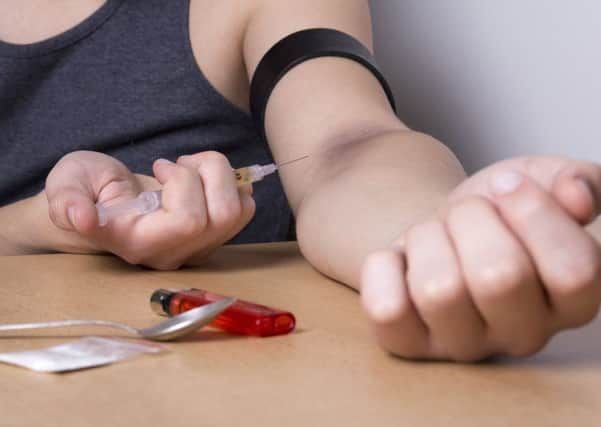NHS bosses ask shops to stop selling legal highs


Doctors are dealing with patients who have taken New Psychoactive Substances (NPS) on a daily basis – and six people have died after taking the substances in the past year.
Drug addicts are also injecting the so-called “party drugs” as an alternative to heroin or mixing them together – leading to skin ulcers, blood poisoning, and even amputation.
Advertisement
Hide AdAdvertisement
Hide AdLegal highs now account for around 20 per cent of admissions to the poisons unit at Edinburgh Royal Infirmary.
In a desperate bid to stem hospital admissions, Professor Alison McCallum, NHS Lothian’s director of public health, has taken the unprecedented step of writing to all “head shops” in the Capital urging them to stop stocking the items.
Her letter lists complex health problems caused by the substances, including infections of the lungs and heart, hallucinations and delusions.
NPS – which come marked as “not for human consumption” to get around the law – have also led to police reports of a spike in bizarre and violent behaviour.
Prof McCallum appealed for shop owners to “take responsibility” for the products they sell, which she warned were creating an “alarming increase in physical and mental health problems”. The letter adds: “Their use and easy availability has destabilised patients who were previously doing well in treatment for substance problems and mental health issues. We are aware of deaths associated with the use of legal high products on sale in Lothian. These are dangerous, unregulated drugs and continue to pose a considerable threat to individual and public health.”
Prof McCallum, who sent the letter to 24 shops across the Lothians, was particularly keen to see so-called “bath salts” removed from under the counter. Their chemical name is ethylphenidate, and city doctors say they cause the biggest problem.
Jim Sherval, consultant in public health at NHS Lothian, said Prof McCallum’s letter was a “highly unusual step”.
He said: “I think it’s a reflection of the fact that we don’t have the normal levers to use. It’s a very unusual and challenging situation.”
Advertisement
Hide AdAdvertisement
Hide AdMr Sherval said there was also a concern that retailers, including newsagents, may not know the danger of the substances. The poisons unit at Edinburgh Royal Infirmary deals with around 40 patients who have consumed legal highs every month – around a fifth of all admissions. “A year or a year-and-a-half ago we had far fewer – it would have been a percentage in the low single figures,” said Mr Sherval.
NHS chiefs have been working closely with Police Scotland and the city council as the issue continues to put pressure on all services. A council report released in January revealed that six people died after taking the drugs between January and October 2014.
Chief Superintendent Mark Williams, police divisional commander for the City of Edinburgh, said: “So-called ‘legal highs’ are far from safe and it is almost impossible for anyone using NPS to know what they are taking or the risks these chemicals will have on their bodies and minds.”
Users Injecting ‘bath salts’
THE worrying trend of legal high use has been worsened by a rising number of drug addicts injecting the substances.
“Bath salt” powders – which also go by the names Blue, Blue Stuff and Burst – are being routinely injected by users. These contain ethylphenidate, a corrosive stimulant said to give a short-term high which is prone to make people aggressive.
Jim Sherval, consultant in public health at NHS Lothian, said the powder was often injected with shared equipment.
He said: “People are tending to inject at a much higher frequency than they would if they were injecting heroin. It’s a great route of entry for infection. Ethylphenidate by injection is quite distinctive to the Edinburgh area at the moment. We have seen around 100 people with injection-related infections so it’s clearly not a tiny number, and there have been a range of problems with that. I have heard we have had one amputation.”
Edinburgh-based consultant clinical toxicologist Dr James Dear said he came across patients who had taken NPS on a daily basis, adding: “We see people who are injecting, often heroin users who have been using legal highs with heroin. They get terrible skin ulcers.”
Advertisement
Hide AdAdvertisement
Hide AdThe trend has also prompted community concerns about discarded needles.
A place for the poisoned
The Scottish Poisons unit deals with people who have been poisoned by drugs or other substances.
Its ten-bed ward within Edinburgh Royal Infirmary admits around 1,500 patients every year, dealing with everything from drugs overdoses to more unusual cases.
But the unit has a two-pronged purpose. Its specialists also offer vital advice on the diagnosis, treatment and care of patients who have been poisoned, either by accident or intentionally.
This second strand of the poisons unit is the National Poisons Information Service, which is the first port of call for doctors dealing with an unusual case. Around 2,000 consultations are carried out every year.
Regular research is undertaken by consultant clinical toxicologists and specialists, building up a wealth of information on poisonings. Information is put on an online database which doctors can access for details on diagnosis and treatment.
The unit at Edinburgh is part of a network of four poisons units across the UK, alongside Birmingham, Cardiff and Newcastle.
On-call consultants are based at all units, with additional staff in York and London.